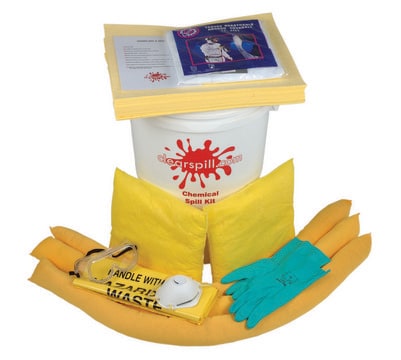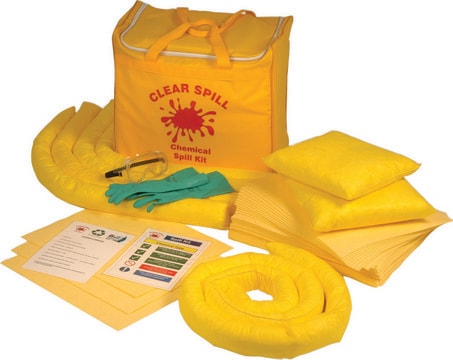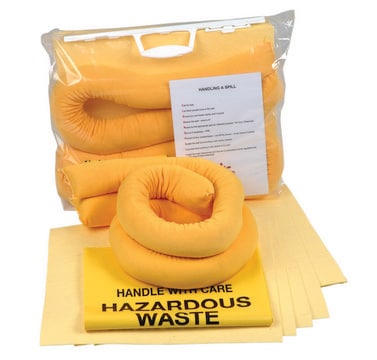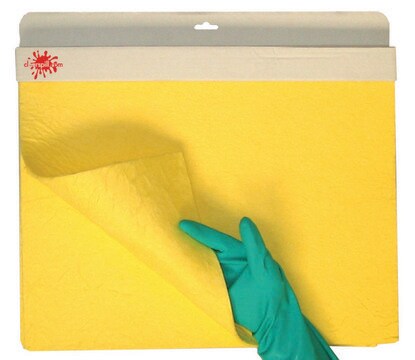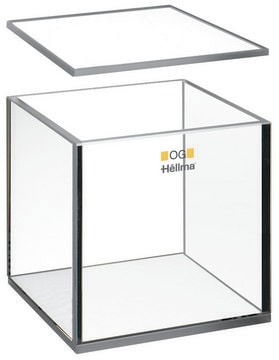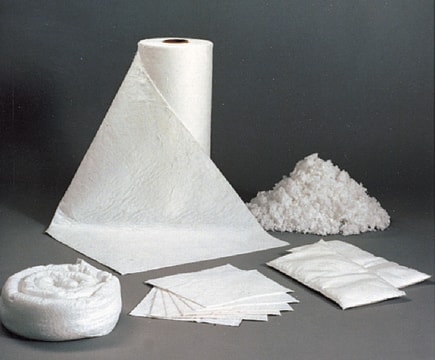Z288500
Aldrich® Imperial mini-spill kits
capacity 3.6 gal (13.6 L)
Sign Into View Organizational & Contract Pricing
All Photos(1)
About This Item
UNSPSC Code:
47131905
NACRES:
NB.35
Recommended Products
capacity
3.6 gal (13.6 L)
Looking for similar products? Visit Product Comparison Guide
General description
Kit contents: ten 12×12 in. universal PP sorbent pads; two 3 in.×4 ft universal socks; one brush/pan kit; one pair nitrile gloves; one 18×30 in. disposal bag; one 5 gal HDPE bucket with lid.
Designed for safely handling the cleanup of small chemical spills in the research laboratory. Kits feature "No Decision Response" universal polypropylene sorbent pads and "socks" that are suited for non-aggressive, hydrocarbon-based, and aggressive liquid leaks or spills.
Kit components are packed in a sturdy HDPE bucket with tight-fitting lid that is used for containment of used sorbents. Spill response instructions are printed on bucket label for fast access.
Caution: Care should be taken when using these sorbents to pick up fuming acids (such as nitric or sulfuric acid), as well as strong oxidizers since they may degrade the polypropylene material.
Kit components are packed in a sturdy HDPE bucket with tight-fitting lid that is used for containment of used sorbents. Spill response instructions are printed on bucket label for fast access.
Caution: Care should be taken when using these sorbents to pick up fuming acids (such as nitric or sulfuric acid), as well as strong oxidizers since they may degrade the polypropylene material.
Legal Information
Aldrich is a registered trademark of Sigma-Aldrich Co. LLC
Choose from one of the most recent versions:
Certificates of Analysis (COA)
Lot/Batch Number
Sorry, we don't have COAs for this product available online at this time.
If you need assistance, please contact Customer Support.
Already Own This Product?
Find documentation for the products that you have recently purchased in the Document Library.
Customers Also Viewed
Y Y Xiao et al.
Epidemiology and infection, 143(9), 1833-1838 (2014-11-02)
No published studies have discussed details of the prognosis and survival of patients with severe avian influenza A(H7N9) infection. In this study we analysed 128 laboratory-confirmed cases of severe H7N9 infection in Zhejiang province, the most affected region during the
James Neil Fisher et al.
Oncotarget, 6(15), 13176-13200 (2015-05-12)
SKBR3-cells, characterized by ERBB2/RARA co-amplification, represent a subgroup of HER2+ breast-cancers sensitive to all-trans retinoic acid (ATRA) and Lapatinib. In this model, the two agents alone or in combination modulate the expression of 174 microRNAs (miRs). These miRs and predicted
Tu'uhevaha J Kaitu'u-Lino et al.
Pregnancy hypertension, 5(4), 294-297 (2015-11-26)
There is recent interest for uniform placental collection protocols so laboratories can share samples. However, concerns have been raised a wash step at collection causes significant loss of sFlt-1 and soluble endoglin, among the most studied proteins in placentology. We
Vinai C Bhagirath et al.
Shock (Augusta, Ga.), 44(3), 265-271 (2015-05-07)
Cell-free DNA (CFDNA) is elevated in sepsis and correlates with mortality. This DNA may come from nuclear, mitochondrial, or bacterial sources. Cell-free DNA from all three sources may play a pathogenic role in sepsis via activation of coagulation through the
Joseph L Sottnik et al.
Cancer research, 75(11), 2151-2158 (2015-04-10)
Cross-talk between tumor cells and their microenvironment is critical for malignant progression. Cross-talk mediators, including soluble factors and direct cell contact, have been identified, but roles for the interaction of physical forces between tumor cells and the bone microenvironment have
Our team of scientists has experience in all areas of research including Life Science, Material Science, Chemical Synthesis, Chromatography, Analytical and many others.
Contact Technical Service